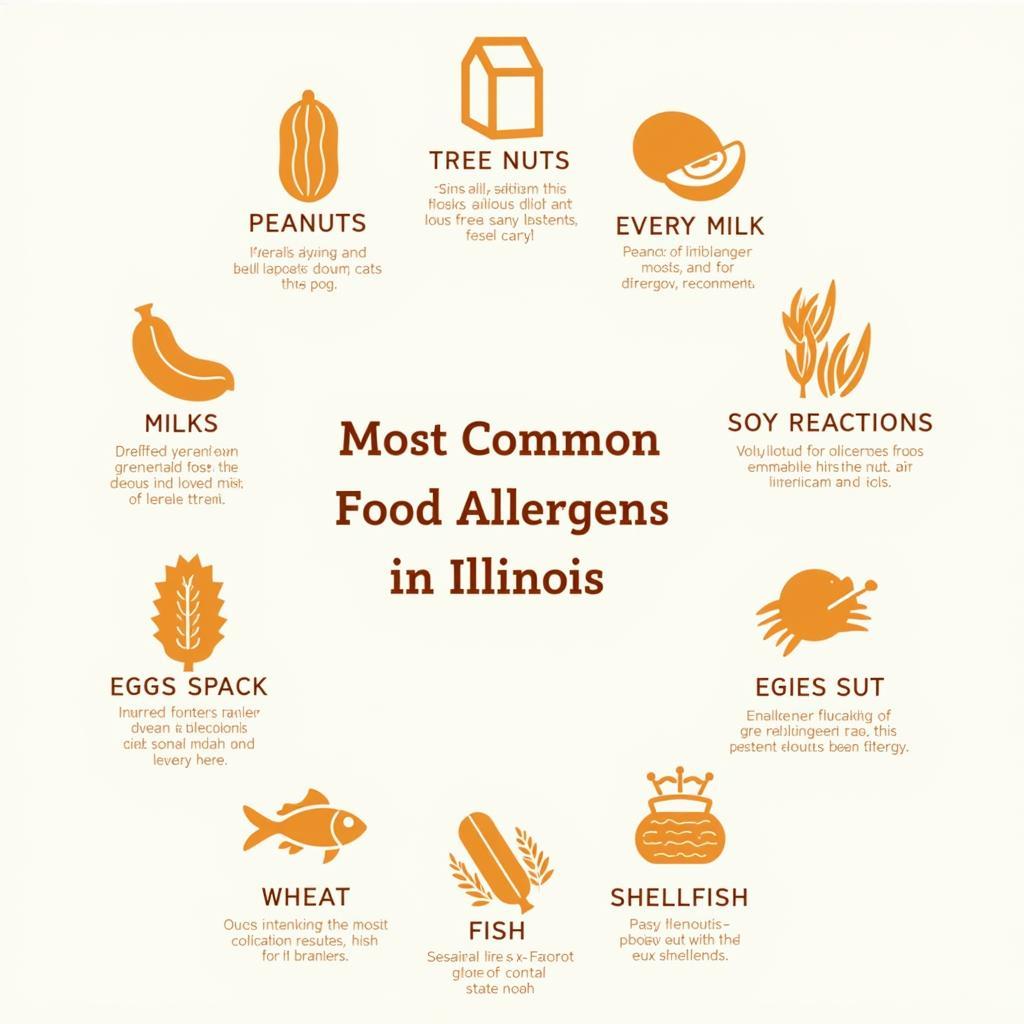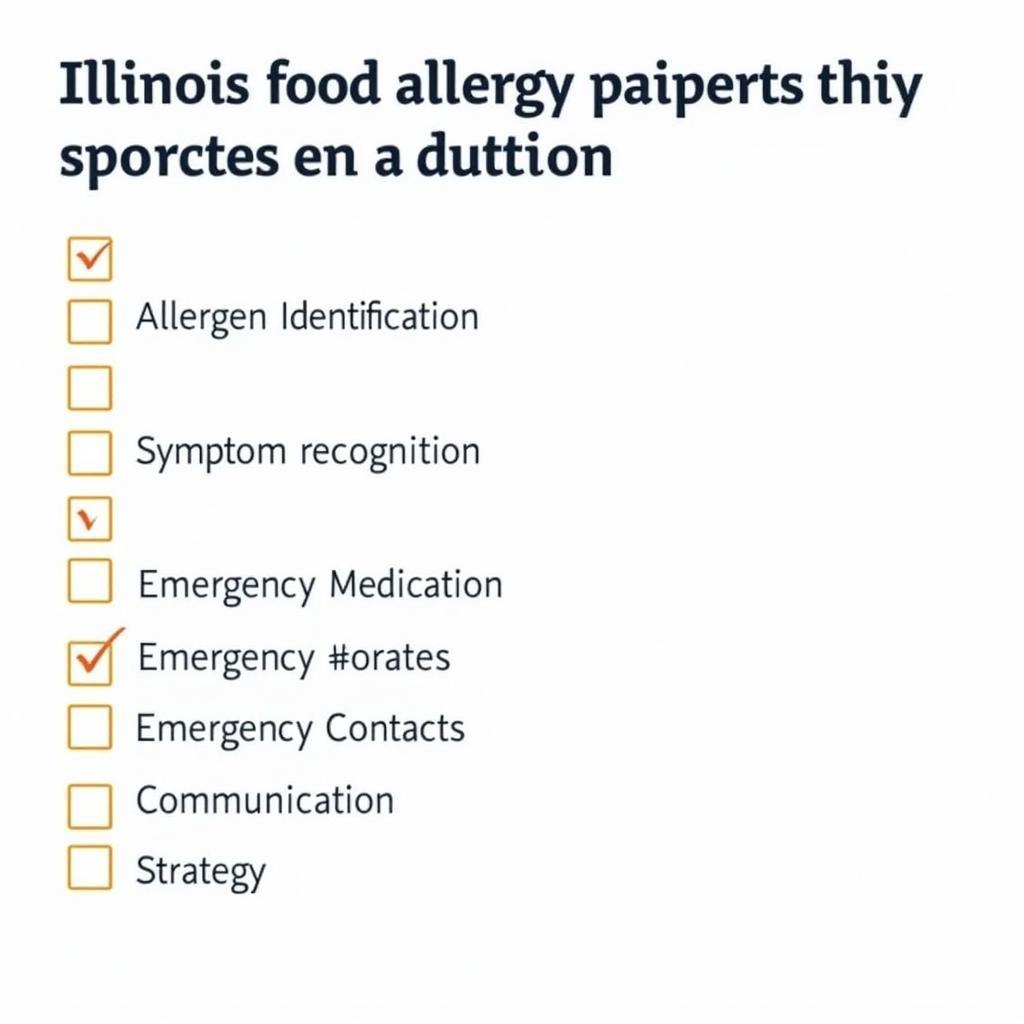Managing food allergies, especially in Illinois, requires a well-defined emergency action plan. This is crucial not only for individuals but also for schools, restaurants, and any environment where food is served or consumed. A proactive approach can prevent a minor reaction from escalating into a life-threatening emergency.
Understanding the Importance of an Illinois Food Allergy Emergency Action Plan
Having a food allergy emergency action plan is like having a fire drill for your body. It prepares you for the unexpected and ensures quick, effective action when an allergic reaction occurs. This plan is not just about knowing what to do; it’s about empowering individuals and those around them to respond confidently in a crisis. An effective plan outlines clear steps to take in the event of an allergic reaction, from recognizing the symptoms to administering medication and seeking medical assistance.
What Triggers Food Allergies in Illinois?
Common food allergens in Illinois mirror national trends, including peanuts, tree nuts, milk, eggs, soy, wheat, fish, shellfish, and sesame. While these are the most prevalent, any food can potentially trigger an allergy.
 Common Food Allergens in Illinois
Common Food Allergens in Illinois
Understanding potential triggers is the first step in developing an effective emergency action plan. This involves careful identification of specific allergens and implementing strategies to avoid exposure.
Developing Your Illinois Food Allergy Emergency Action Plan
Creating a comprehensive food allergy emergency action plan requires a personalized approach. While general guidelines exist, the specifics should be tailored to the individual’s allergies, age, and overall health.
Key Components of an Effective Plan
A well-structured plan should include the following:
- Allergen Identification: Clearly list all known allergens and their potential sources.
- Symptom Recognition: Detail the specific allergic reaction symptoms the individual experiences. These can range from mild itching and hives to severe anaphylaxis, which includes difficulty breathing, swelling of the throat, and a drop in blood pressure.
- Emergency Medication: Specify the prescribed medication (e.g., epinephrine auto-injector) and instructions for administration. Include dosage, injection site, and potential side effects.
- Emergency Contacts: Maintain a list of emergency contacts, including family members, physicians, and the individual’s allergist.
- Communication Strategy: Establish a clear communication plan for informing others about the allergy and the emergency action plan. This is especially important for schools, daycare centers, and other community settings.
 Food Allergy Action Plan Checklist
Food Allergy Action Plan Checklist
Training and Education: Empowering Others
Beyond the written plan, education and training are vital. Everyone involved in the individual’s care, including family, friends, teachers, and caregivers, should understand the allergy, its symptoms, and the steps outlined in the emergency action plan. Regular practice drills can help solidify these procedures and ensure a swift, effective response in a real emergency.
Illinois Food Allergy Resources and Support
Navigating food allergies can be challenging, but there are numerous resources available in Illinois to support individuals and their families. Allergy support groups, online forums, and educational websites offer valuable information, guidance, and a sense of community.
Connecting with Allergy Specialists in Illinois
Connecting with a qualified allergist is essential for accurate diagnosis, personalized treatment plans, and ongoing management of food allergies. These specialists can provide expert advice on avoiding allergens, managing reactions, and developing a comprehensive emergency action plan.
Living Confidently with Food Allergies in Illinois
Living with food allergies doesn’t have to be restrictive. With a well-defined Illinois Food Allergy Emergency Action Plan and the right support, individuals can lead full and active lives. Proactive planning, education, and open communication are key to navigating daily challenges and enjoying life to the fullest.
Conclusion
An Illinois food allergy emergency action plan is a critical tool for managing food allergies effectively. By understanding the importance of preparation, identifying key components of a plan, and accessing available resources, individuals can confidently navigate the challenges of food allergies and ensure their safety and well-being. Don’t delay; start developing your plan today.
FAQs
- What is anaphylaxis? Anaphylaxis is a severe, potentially life-threatening allergic reaction that requires immediate medical attention.
- How do I get an epinephrine auto-injector? You need a prescription from a doctor.
- Can food allergies develop later in life? Yes, food allergies can develop at any age.
- Where can I find certified allergy-friendly restaurants in Illinois? Several online directories and resources list certified allergy-friendly establishments.
- Are there support groups for families dealing with food allergies in Illinois? Yes, various support groups offer valuable resources and a sense of community.
- What should I do if I accidentally ingest an allergen? Follow your emergency action plan immediately and seek medical attention if necessary.
- How often should I review and update my food allergy emergency action plan? Review and update your plan at least annually or as needed due to changes in allergies or medications.
For immediate support, please contact us at Phone Number: 02437655121, Email: [email protected], or visit our address: 3PGH+8R9, ĐT70A, thôn Trung, Bắc Từ Liêm, Hà Nội, Việt Nam. Our customer service team is available 24/7.
We also have other helpful articles on our website regarding food allergies and related topics. Check out our blog post on “Navigating School with Food Allergies” and “Tips for Allergy-Friendly Travel”.